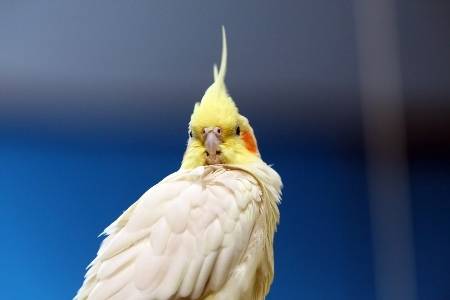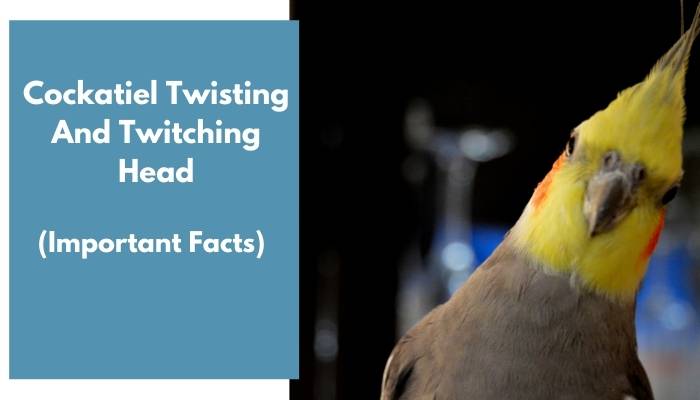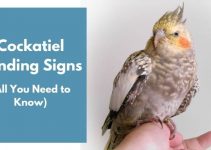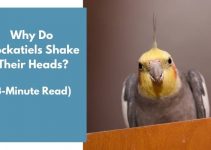A cockatiel is one of the most popular companion birds nowadays. It’s cuddly, outgoing, and funny that makes it loved by all pet owners.
A cockatiel twists its head because it is listening for something. They move their head from one side to another, then move it up and down, or cook their head at a slight angle.
While a cockatiel twitches its head, it suffers from ailments, whether it feels something terrible in its head, limbs, full-body, or wings. Also, cockatiel twists its head because of toxicity, injury, or a viral infection.
Cockatiels are also a brilliant whistler. The male cockatiels are known for their whistle serenades, which they sing for their favorite person, food, object, or self.
If they’re not whistling or they want to keep themselves busy hunting their food around their cage, cockatiels spend their time snuggling with their favorite person’s shoulder.
Also, they love to eat a variety of seeds, fruits, berries, and vegetables.
Having a healthy, social cockatiel can be an excellent addition to your family, and it’s also ideal if you’re living in an apartment. If you’re planning to get yourself a cockatiel, first you need to understand their behavior. To learn more about the cockatiel personality and characteristics, you may want to keep reading.
Contents
Why Does My Cockatiel Twist His Head?
Just like other animals, cockatiel also tells you much about what they feel through body movement.
If you have a cockatiel at home, you may need to pay attention, and you’ll be able to learn when they’re mad or happy.
Also, as a pet owner watching your pet’s movements can help you determine what they want.
You May Also Read – Cockatiels egg laying process
Cockatiels always seem to have something to say not with their mouth but using their heads.
The way they position their head determines its mood, emotions, want, and how she feels about you.
Here are the five different types of twisting direction that cockatiel does.
1. Lowering Their Head
It is their greatest compliment you cockatiels can give you is lowering their head. Lowering their head means that they trust you completely, and they want you to scratch its back.
Cockatiels always love a gentle scratch from their cheeks, ears, head, and crest. Doing this to them makes them a happy bird.
2. Shake Their Heads
A young Cockatiels shakes their head and often screams when they’re hungry. While older cockatiels don’t usually do this.
But if you notice that they’re shaking their head whenever you’re talking to them, it means that you need to lower your voice.
Hence, if they shake their head while eating, they don’t like the food.
3. Move Their Head Up And Down
When your cockatiel moves their head up and down, it means that they are listening. They twist their head up and down since their eyes occupy more space than their ears.
4. Dropping Or Tucking Its Head
Dropping or tucking its head are the odd movements that your cockatiel does. It means that they feel sick.
So, if you notice that it tucks its head up under its wing or turns its head toward its wing with an eye only partly close, it’s the sign of an illness, infection, or malnutrition; call a veterinarian right away.
5. Doing Crest Movement
You can tell if your cockatiel is happy if they raised their crest of a feather. Also, a raised crest movement is a sign that they are afraid of another bird.
While a flexible crest means he/she is content. If their crest is pressed tightly down against their neck means it’s angry, and it’s not the best time to play with your bird.
What Does It Mean When A Bird Tilts Its Head?
Birds are usually described as moody. Today it’s playful and loving, and after that, they become demanding and aloof.
Sometimes this behavior is apparent, and sometimes it’s not. Hence, your bird’s body language helps you determine what it needs and wants.
So, if your bird is looking at the ground with one eye while tilting its head, it means that they are listening to insects’ movement.
However, if it tilts their head up, they are looking for predators in the sky or above them.

Why Does My Cockatiel Twitch His Head?
A Cockatiels twitches its head for a lot of reasons, both young and old cockatiels. The main reason could be their food sticks on their beaks.
Cockatiels are particular for being clean, and they can’t tolerate small dirt in their beaks and other areas of their body.
To keep their beaks clean cockatiels, twitch their heads or rub their beaks along the side of their home or in branches to remove the food that sticks on them.
You may usually see your cockatiel’s twitch its head when eating messy food like fruits and vegetables.
However, your cockatiels twitch their heads not just to clean their beaks but also their feathers.
Below are the four reasons why they twitch their head to clean their feathers.
First, they moisturize their feather with preen oil; it has to make their feather flexible and robust. It helps your cockatiels to withstand the stress of flying.
Also, to help them make their feather waterproof and ready against adverse conditions like soaking from the extreme hot or cold temperature.
Second, they twitch their head to remove the parasites in their feather-like body lice that may harm their feathers.
Also, cockatiels twitch their head top to remove the tough sheaths from their feathers.
Third, they clean their feathers to become healthy at the same time to attract a mate.
A healthy and clean cockatiels attracts a stronger mate, and they gain a better chance to raise a healthy and robust chick in the future.
Fourth, cleaning their feathers together with other cockatiels. It is also one of their communication skills between their mates that keeps them connected with one another.
It is no surprise why cockatiels are so clean; it is because of their behavior.
What if all humans acquire the behavior of cockatiels? Probably, all of us have a clean and great environment.
You May Also Read – Do female cockatiels sing and talk?
Do You Have To Worry If Your Cockatiel Twist Or Twitches Its Head?
You don’t need to worry if your cockatiel twists or twitches its head since these are their way to communicate with you.
If you’re planning to purchase a cockatiels for your home, you should be aware of its personality and characteristics.
Moreover, one of the critical aspects of creating and maintaining a successful relationship with cockatiels is your ability to understand their body language.
Cockatiels communicate with you using sounds, their behaviors, and actions. Using their body language and sounds, they can tell you when they need help, happy, content, angry, angry, sick, hungry, tired, or need love.
Your ability to communicate with them is the vital element that you should learn before having a cockatiels.
It’s your responsibility to learn to interpret their actions to successfully tame, train, and give them the best care they want.
However, the actions of cockatiel’s don’t mimic the meaning of other bird’s body language, so it’s your responsibility to know more about them before you care one.
If you have already chosen a feathered friend, try to distinguish what they are telling you and respond accordingly to their needs.
When To Visit A Vet With This Problem
Many birds have a long lifespan, and it is why most people love to take care of a feathered friend. It is also because it is rewarding to take care of a bird to play with them for a long time.
Hence, your birds also need a vital checkup to ensure that they are healthy and live a full life with you.
Moreover, there are lots of signs when your bird needs to visit a vet. Below is the sign that your bird needs a checkup.
- If you notice that your bird is less active and social than usual, it could be a sign that it’s not feeling sick.
- If you notice that your bird is fluffed up more than before, moving it’s feathers more often, it could be the sign that something is wrong with them. Birds need to be warm all the time, so when they puff up their feathers, it’s like they are putting a coat to themselves. If it performs repeatedly fluffing behavior, this usually happens when your bird doesn’t feel well. A quick checkup is needed during this time.
- If your bird sits around doing little movement and is always fluffed up, it’s time that a veterinarian should take a look at your bird.
- If your bird stops to eat and to get thinner than usual, it needs a checkup.
- If your bird eats a lot than before, this could be a sign that they have digestion problems.
If your bird carries this sign, you should be aware of it. You can also tell that your bird is not in excellent condition if it throws up and its feathers over its head and neck are sticky.
Hence, some regurgitation or vomiting is usual if your bird is under the season of courtship. If your bird regurgitates out of nowhere, check your vet right away.
Do cockatiel sneezing? Learn more here.
Summary
In summary, having a feathered friend like a cockatiels is fantastic because every day is a good day if you’re with them.
Playing with your pet like a cockatiels is a stress-relieving activity. It is why to treat it like your family, and they will treat you with all their loyalty and trust.
There’s no doubt that a cockatiels is one of the best pets you can have, so before buying or getting one learn first how to Take care of them.
Lastly, if you want to become a cockatiel’s owner, being knowledgeable about their body language will make you a useful owner.
Resources
Image credits – Canva
[1] When Should I Take My Bird to a Veterinarian? – AAV.org



